Disclaimer: The following article is an op-ed. The views and opinions expressed in this article are solely those of the author’s and do not necessarily reflect the position of T5E.
With the spaces that were taken for granted by students being erased, one place at a time, is the insti we’ve come to love and cherish slowly disappearing? Memories are being lost, everyday life disrupted, and habits altered. What are the implications for public spaces in insti? Perhaps, there might be attempts at reconstruction, documentation, and if possible, preservation. Perhaps one memory might be replaced with another. But at what cost? What are the scars or traces left after these endeavours?
It feels surreal, considering the fact that most of us spend an average of 4 years in insti.
In this short stint, some places grow on us, and some with us.
These places have seen our highs and lows, watched us goof around, been a silent spectator to the same stories being played out batch after batch. Every year a new layer of stories get added to the walls, with the Annas, and the Akkas, and Chettas watch us come in as wide-eyed freshies taking life-gyaan from our seniors, survive the roller coaster that is college, and complete the circle by giving fundaes about courses, careers, life and beyond, to our juniors.
Considering all these spaces have grown to mean something to every one of us, this year has hit us the hardest. Ask any student who has stayed in insti for even a semester, the first word that comes to their minds when you mention the names Ramu, Zaitoon, K Gate, Suprabha, or Gurunath, is nostalgia. Nostalgia is both a powerful and painful thing. When you think of things that are gone, merely forgotten or is in the process of fading away, it swells up inside you, and you feel like you’ve been punched in the gut. ‘A place for every occasion’ is a sentiment shared by most of the students.
“The night before every quiz, I have a double coffee (sugar kammi) at Ramu”, says one student. “My stress eating routine is ordering a Masala Kulcha and garlic paste at Zaitoon”, says another. “My post dinner ritual is going to K-gate and having a cup of lemon tea”.
The places may have been removed, renovated, or changed, but some things are clearly etched in the memories of students: like how no amount of Odomos could save you from the vicious mosquitoes of Suprabha, students speaking terrible Malayalam hoping they would get food from Zaitoon quicker, the Chettas outside K-gate asking after you if you skip coming there for a day or two, the dry noodles of HULL, the late-night-deep-conversations-triggering recipes served at Ramu, to name a few.
It has been a reality check for everyone, with such major changes being implemented callously without taking into account the opinion of the students.
There is a sadness unique to seeing a place, once vibrant with activity being reduced to a mere emergency exit, or just plainly abandoned.
It’s a longing for the past, the warmth, and the comfort the memories give that trigger it.
All sentiments aside, disappearing public spaces in an institution such as insti is a cause for serious concern. These eateries doubled up as meeting spots for students, especially for large gatherings, group study sessions, or just to hang around and let out some steam. The implications of this is a step forward in the wrong direction- people are getting increasingly isolated and more boxed into their room. Many students are extremely disheartened by the centralisation of these spaces. The disappearance of these public spaces has happened at a much faster rate than the much-assured replacements. They feel there are no real choices to choose from, and the spaces that are available (Himalaya Food Court, Student’s Facility Centre, Quark) are constantly crowded. Even when students try to reclaim other open spaces they are shooed away citing security reasons.
“There’s literally no place to just sit”, says an extremely frustrated student.
We hope these concerns are taken seriously by the concerned authorities. With all the familiar names gone, public spaces shrinking, eateries being limited to one or two places, one can but wonder what is in store for the future.
With my deadlines fast approaching, I go to one of the newly cropped up eateries grumbling how it’ll never be the same anymore. I half-heartedly order a double coffee to serve my caffeine-fix, when the anna behind the counter asks me, “sugar kammi-aa”? I smile thinking, some things might not change after all.
Editor’s Note: This article was written before the Corona exodus. Post Corona, we’d be glad to get back to campus (restaurants or no restaurants) and it will truly, truly be a “fresh start”.




